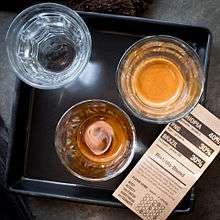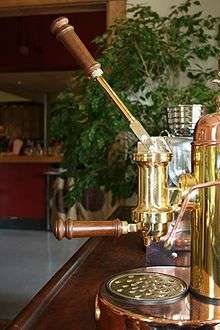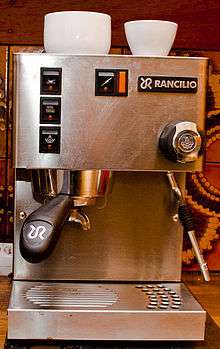Ristretto



Ristretto is traditionally a short shot of espresso coffee made with the normal amount of ground coffee but extracted with about half the amount of water.[1] Since ristrettos are essentially the first half of a full length extraction, the faster-to-extract compounds predominate in a ristretto. The opposite of a ristretto is a lungo, which is typically double the shot volume. Ristretto means “limited” or “restricted” in Italian whereas lungo means “long.” The equivalent in French is café serré.
Regardless of whether one uses a hand pressed machine or an automatic, a regular double shot is generally considered to be around 14–18 grams of ground coffee extracted into 60 ml (2 fl oz or two shot glasses).[2] Thus, a “double ristretto” consumes the same amount of coffee beans but fills only a single shot glass.
Coffee contains over a thousand aroma compounds.[3] A ristretto’s chemical composition and taste differ from those of a full length extraction for three reasons:
- More concentrated: The first part of any extraction is the most concentrated, its color typically lying between dark chocolate and umber, whereas the tail end of shots are much lighter, varying from the color of dark pumpkin pie to varying shades of tan (see photo, above right). This is an important factor when drinking straight espresso shots.
- Different balance: Different chemical compounds in ground coffee dissolve into hot water at different rates. A ristretto contains a greater relative proportion of faster extracting compounds, proportionally fewer of the compounds characteristic of over-extraction, and thus, a different balance.
- Fewer total extracts: Relative proportions aside, fewer total coffee compounds—caffeine being just one—are extracted into ristrettos versus full length shots. This is an important factor when diluting shots into water or milk.
Straight ristrettos—shots that are traditionally drunk from a demitasse and not diluted into a larger cup containing milk or water—could be described as bolder, fuller, with more body and less bitterness. These characteristics are usually attributed to espresso in general but are more pronounced in a ristretto. Diluted into a cup of water (to make an Americano or long black) or milk (e.g. latte and cappuccino), ristrettos are less bitter and exhibit a more intense “espresso” character.[4]
See also
-
 Coffee portal
Coffee portal - Espresso
- List of coffee beverages
- Lungo
References
- ↑ Realcoffee.co.uk, Glossary, R
- ↑ SeattleCoffeeGear.com, “How Much to Grind for a Double Shot of Espresso?”
- ↑ Royal Society of Chemistry, “Chemistry in every cup”
- ↑ Tien Nguyen (November 30, 2011). "The Ristretto: The Lame Duck of Coffee". LA Weekly. Retrieved 2015-02-28.
The flavor is more intense, sweeter, less bitter since bitter components are introduced at the end of the shot....Overall, you end up with a much more pleasant and flavorful beverage.
External links
- CoffeeResearch.org (home page): Coffee Science
- WikiHow: How to Make a Ristretto (Espresso Coffee)
- TooMuchCoffee: The European Coffee and Espresso Resource
